As the elections near next month, Erdogan continues to fight inflation while the nation still reels from the economic aftershocks that hit Turkey back in February, leaving more than 44,000 people dead.
When Turkish President Recep Tayyip Erdogan took office 20 years ago, Turkey’s economy was barely just recovering from the 2001 economic crisis, but quickly spiraled upwards into growth by tackling poverty and reaching upper-middle-income status, per the World Bank.
The country’s GDP per capita jumped from $3,600 when he took office to approximately $12,600 ten years later, but it took a turn for the worst when it started plunging downwards, especially following the Covid-19 pandemic, US sanctions, the global economic collapse, and the devastating February 6 earthquakes.
Erdogan began slashing interest rates to keep investment cheaper and growth more possible, but after inflation started running wild by hitting an estimated 85% annual rate late last year, the president was keen on keeping interest rates low to attract more growth. Unfortunately, that came at the price of the Turkish lira which plummeted gravely.
During an interview for 24 TV last week, Erdogan said, “We’re preparing to further strengthen our economic policies in the period ahead,” adding that “a team under the coordination of [former finance minister] Mehmet Simsek, who participated in the economy’s management for years, is making preparations to that end.”
Suban Cicek, a 35-year-old father of six who lives in the low-income neighborhood of Tarlabasi in Istanbul, expressed: “The last few years have become more difficult financially.”
“The government has always been encouraging us to have a lot of children. Now some of these kids might have to resort to begging or becoming thieves because their families can’t even afford food anymore.”
Turning to gold as an alternative
As the elections near next month, Erdogan continues to fight inflation, while the nation still reels from the economic aftershocks that hit Turkey back in February, leaving more than 44,000 people dead.
Turkish economist Mustafa Sonmez explained that “the government has introduced regulations that have helped stabilize our currency ahead of the elections, but this stability is an illusion and doesn’t reflect the actual market price of the Turkish lira. It’s a temporary relief, aided partly by Russian and Gulf investments, but it’s not a long-term solution,”
Economists generally expect growth to gradually slow from 5% to nearly 3%, but simultaneously predict that annual inflation will fall from current highs to 40% if not less by the end of the year.
As a result of the fear of a major economic collapse in the country and to protect what’s left of savings, many Turkish citizens have turned to gold as an alternative. When the Turkish Lira hit a 24-year low last year, the nation’s central bank became the world’s biggest gold buyer.
Zahit Akbas, a third-generation gold trader who has a shop in Istanbul’s Ottoman-era Grand Bazaar, has been running the four-decade family business and has observed that while older people used to buy gold more than the young, today that has been the opposite.
“Even though the last few years have seen the highest inflation in a long time, people keep buying gold, and I’m now mostly seeing younger people—those in their 30s—investing. They don’t trust the currency they are earning anymore, so they exchange it for gold,” Akbas said, adding, “I’ve seen people spend all of their savings on gold… these days, it’s one of the safest bets.”
english.almayadeen.net
